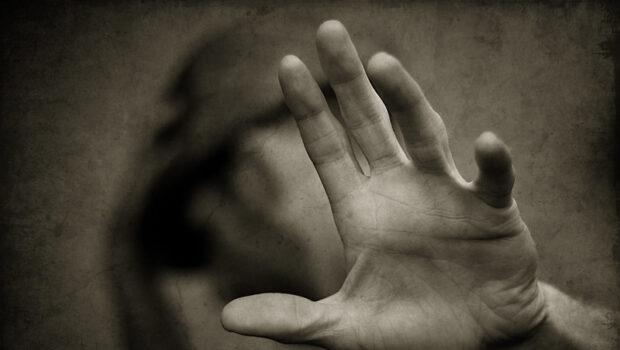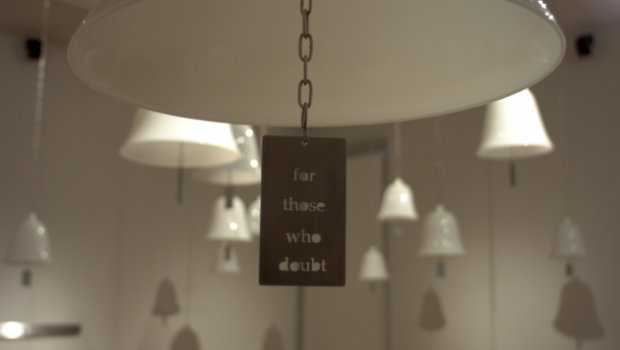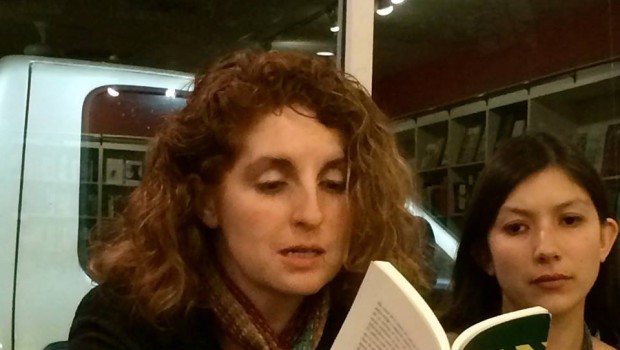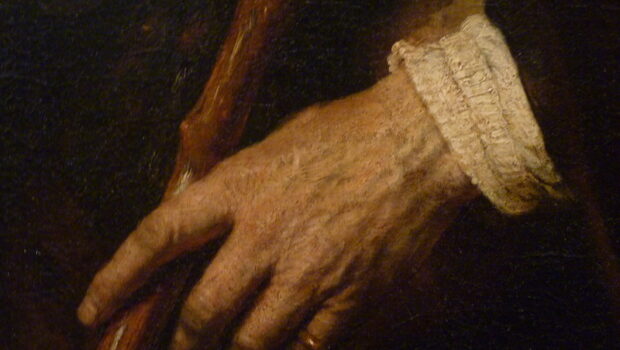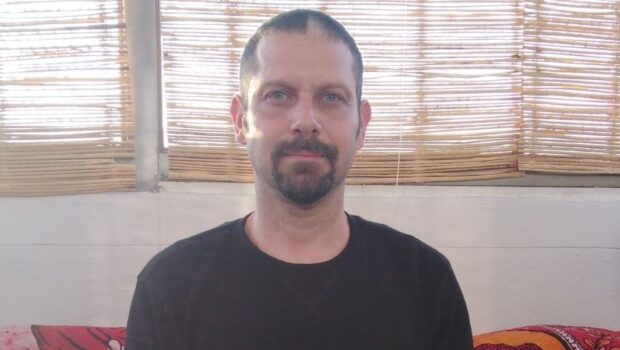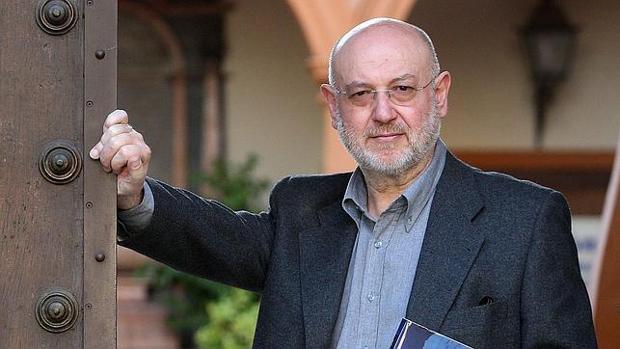Sábado Gigante
Estella Gonzalez
His father’s hands, compared to his own, looked like corn. Gustavo’s hands were soft, the color of a brown paper bag. His hands usually held a pen, not a knife, mop or rags like his father’s. His dad, Bernardo, washed dishes and bussed tables at La Fonda restaurant near Downtown LA. Gustavo’s hands were softer than his mother’s. She worked the sewing machines down in the Garment District. Sometimes, from his office window, he would watch the mexicanos who looked like his parents boarding the RTD buses or trudging along, maybe chatting with friends or coworkers after they got off at the bus stop.
Gustavo’s hands didn’t need to count out the cuoras, daimes and nicles for the bus. When he was in high school, he had a bus pass, not a car. Now, driving his own car, his hands gripped the hard plastic of the steering wheel and the gear shift. And now, he was saving up enough money to buy his parents a car, even though he was just an entry-level office assistant. He had just gotten paid enough to make his car and insurance payments. Maybe he could have gotten up at 4 in the morning to help his mother cook breakfast and roll the burritos for lunch, but he needed to sleep. His mother understood. So did his father, who didn’t seem to mind walking his mother early in the morning to the bus stop on Whittier Boulevard while carrying both of their lunch pails.
Sometimes, before his parents left their small house, Gustavo could hear them stepping carefully, quietly, trying not to wake up their working son. Sometimes, he’d help his sister Maritza with breakfast, but he usually didn’t. She was the oldest daughter, after all. Maritza was the one chosen to cook breakfast for him, the only boy among two sisters. True, they lived in East LA, not Guadalajara or Chihuahua, but the women still had to take care of the men.
Although she and Alma washed the dishes, did the laundry and mopped the floors, they also went to school. Maritza still obeyed Gustavo, but Alma was the rebel. One time, she refused to clean up his room.
“I’m not pickin’ up your dirty underwear,” she told him, waving his Fruit of the Looms at the end of a broom handle. Gustavo slapped the broom out of Alma’s hands, then slapped her hard, leaving a red imprint on Alma’s soft brown cheek. He would sometimes see a similar handprint on his father’s cheek when he came home drunk from the billiards hall. Gustavo wondered if the slap had come from his mother or another woman.
At work now, Gustavo inputs data, his soft tap, tap on the keyboard soothes his palm, which still stings. When the cute architects at the firm, the one with the mustache like Tom Selleck, asked him to help with a project, Gustavo was thrilled, even if it meant running copies back and forth between offices, copying and collating pages, suffering paper cuts and ink stains for days. Still, it was better than getting the burns, calluses and patches of dry skin that his mother had on her hands. One time, his mother came home with stitches on the fleshy part of her palm, just below the thumb. Maritza had to miss school to take her to the doctor’s office. Gustavo couldn’t spare the time, and his father’s job never gave him time off. His dad was getting paid below minimum wage under the table. Gustavo had a real job, benefits and all. He strived to let his manager know he was not some lazy Mexican. No way.
One Friday, the cute boss with the mustache asked Gustavo to go out with him and a group of other men from the company for a few drinks. Gustavo’s heart beat faster. He would later learn that his boss went by the name of Tristan, like the knight from the famous Tristan and Isolde legend. This was the first time he was asked to join in a group outing. In high school, most of the boys avoided him. He had a few friends in class but hardly ever went to the backyard parties held on weekends.
“No fags allowed!” the guys with the flyers would say as soon as Gustavo reached for one. Those same boys belonged to the Boys from Brazil party crew who “dressed to impress” in their skinny ties, black cardigans and black jeans. Most sprayed their hair into stiff round pompadours and wore thin mustaches clipped close to their upper lips. Gustavo desired them and hated them as well but would never say anything. He would just slip one of their flyers into his backpack.
Gustavo’s face would burn at the gay slurs. Every morning in high school, he dug deep into his closet for the jeans and T-shirts he saw other boys wear to avoid detection. Sometimes he wore a polo, but not the nice button-down long-sleeve shirts he preferred. Gustavo did not want to chance giving himself away. That was then. This Friday night, he was giving his whole life away to Tristan, at least for the night at the Studio One disco.
With Thomas Brothers Guide open to the West Hollywood map on the passenger seat, Gustavo tracked the snaking traffic through Wilshire Boulevard, Vermont Avenue, the Hollywood freeway and finally off the Santa Monica Boulevard ramp. Studio One was so close to his job, so easy to spot with its two stories and flashing windows. As he walked up to the entrance canopy, the thumping beats of “Blue Monday” pounded through the door to his bones, shaking him awake to the night. Tristan waved Gustavo over. He practically ran up to Tristan, who smiled and embraced him. Gustavo almost kissed him but held back.
“So glad you made it,” Tristan whispered, his mustache brushing against Gustavo’s burning ears.
Suddenly, there was a blonde muscular man in a red tank top staring at them from the door.
“Got your ID?” Tristan asked.
As they pulled out their driver’s licenses, the doorman looked Gustavo up and down and said, “Wetback night was yesterday.”
“What?” Gustavo asked, his face flushing.
“Don’t listen to him,” Tristan said, gently caressing Gustavo’s lower back. “Let’s dance.”
Before he knew it, Gustavo was dancing with Tristan under the strobing lights and lasers. Before he knew it, he was drunk on fuzzy navels and Long Island iced teas and making out on the dance floor.
It was the first time he used a condom. It was also the first time he spent a night away from home. When he woke up next to Tristan that early Saturday morning, he smiled. He knew he had to leave before his parents missed him, before his sisters could snitch on him. As he drove down the brightly lit 101, the sun was barely peeking above the San Gabriel mountains, rosy with the dawning. He sang along with the Howard Jones number playing on the radio to help him stay focused on the road and not on the patrol cars prowling the freeways like hungry cats, especially on the weekends. “What Is Love?” Gustavo sang half seriously. Before he could slip his key into the lock for the metal screen door, his mother opened it. She had waited up for him. The black Singer sewing machine with its treadle stood by the window in the living room, glowing in the milky light of the imitation hurricane lamp.
“Next time, call,” his mother said as she let him in. “Are you drunk?”
Gustavo shook his head.
Alma stared at him from the slightly opened door of the bedroom she shared with Maritza. She snorted when he said he wasn’t drunk. In his room, his mother had lowered the shade and drawn the curtains, just like she did for her husband on those nights he came home drunk.
hh
On weekends Bernardo would set up their folding table in the garage to play cards with his friends from La Fonda restaurant and pool hall: Juanito, Nacho and Adolfo. They would huddle around the table Gustavo and his sisters used to play Uno, checkers and shape Play-Doh when they were kids. Bernardo would also set up the portable record player from Gustavo’s room so as to play ranchera music by his three favorites: José Alfredo Jiménez, Vicente Fernández and Antonio Aguilar.
That Saturday afternoon following the Studio One meet-up, Gustavo waited for Tristan to call him. Gustavo knew it would be a long night when he spotted his father’s Carnation Milk crate filled with his favorite Mexican albums beside the card table. All afternoon, his mother busied herself with housework and the piecework from the garment factory, sometimes pausing to watch Sábado Gigante on the color TV in the living room. When they were younger, his sisters would spend most of their Saturday afternoons at the Puente Hills Mall, spritzing perfumes at the cosmetics counter at Robinsons May or eating at the pizza joint in the food court. Afterwards, they would join Gustavo and their mother in his bedroom to watch the disco dancing competitors on Fiebre, Mexico’s answer to Dance Fever, which Gustavo also watched religiously on Friday nights. Inevitably, Maritza would make him dance and imitate the moves they saw on the program.
“Qué bonito bailan,” his mother would say, while Alma clapped like a flamenco dancer.
“You dance just like Giro,” Alma would tell him, referring to Fiebre’s host.
Soon, she’d be jumping in between Gustavo and Maritza, dancing in time with their routine. One time, all three siblings danced a routine they had choreographed together for Bernardo and his friends. As they waved their hands and jerked their legs in unison, the men laughed and cheered. Later that night, Bernardo cornered his son in the bathroom.
“Me la vas a pagar if you turn out to be a joto,” Bernardo whispered. Then, with a slicing motion, Bernardo said in a quieter breath, “I’ll kill you.”
From then on, Gustavo just danced with his sisters in his room, never in front of their father. As he grew into his teens, Gustavo learned to hate those Saturday nights. And as the years wore on, his father grew drunker, louder and angrier. By the time Bernardo’s friends would leave, usually at around midnight, Bernardo would be sobbing, his head down on the card table, a can of Coors in his fist. Tonight would be no different.
“¡Aquí no es mi tierra!” he’d slur, lamenting being so far from his homeland.
After spending most of the night in the garage, Bernardo would be carried back into the house by Gustavo and his mother. As soon as they got him into bed, his mother would go back to her sewing machine in the living room.
“Amá, go to sleep,” Gustavo would whisper above the whirring.
“I’m not sleepy anymore,” she’d say as she treadled the sewing machine in the dim light of the hurricane lamp. “I have too much work to do.”
While Gustavo lay in his bed nursing a headache, he heard his sisters helping his mother with breakfast. He’d barely slept for about two hours before his mother and sisters started clanging pans, slamming drawers and dragging chairs across the linoleum floor. Chorizo, eggs and potatoes were on the menu, but this morning the usually appetizing smells nauseated him. He wanted something light, like the grapefruit and oatmeal breakfast Tristan had offered to entice him into staying at his apartment that early morning before he had left to return home.
“I have to get home before my dad wakes up,” Gustavo told Tristan, and kissed him before he left.
“I’ll call you tomorrow,” Tristan shouted before Gustavo shut the door behind him.
Gustavo’s lips tingled at the memory of Tristan’s mustache. Before he knew it, Gustavo had dozed off remembering his first kiss, a real kiss with a man he’d desired from the moment he had seen him walking along the white halls of the architectural firm. When Tristan introduced himself as his supervisor, Gustavo could not even say his name.
“Hello, Gus,” Tristan said, shaking his hand firmly.
The moment he said, “Gus,” the memory of Maritza singing “Get on the bus Gus,” when they’d ride the city bus to downtown popped into his head. She kept singing the phrase over and over until he slapped her across the head when his mother wasn’t looking. Maritza tried slapping him back, but he ducked before she slapped the metal pole. He laughed at the memory, then dozed off again.
“Are you awake?” Maritza said, pulling Gustavo from his memories. “Mom needs you to mow the lawn.”
Gustavo threw a pillow at her as she slammed the door shut. How could she not see that he was not in the mood to do anything today? He covered his ears with one of the shams his mother had made for him after describing one he saw in the bedding department at Bullocks.
“Amá,” Maritza yelled. “Gustavo won’t get up.”
As he looked up at the ceiling, the room began to spin. He gripped the sides of the bed, trying to make the spinning stop. His stomach was in upheaval. He stumbled out of bed and went to the kitchen.
“About time,” Bernardo said with a quick nod.
Maritza rolled her eyes as she tucked another corn tortilla into the folds of the dishtowel set between the two men. Gustavo’s face burned. They knew he wasn’t alone last night. He quickly backed into the bathroom, lifted the toilet lid and threw up. Alma watched him from the open door, gesturing for Maritza to come over.
“Hungover,” Maritza said. “He’s just like dad on Sundays.”
Gustavo could feel Alma nodding, smirking. He wished he could slap it off her face, but the dry heaves were overwhelming. Soon he felt his father’s hands shaking him.
“Toma, m’ijo,” Bernardo said, his father’s cracked fingers offering him a can of 7 Up.
Gustavo rolled the cold wet can on his forehead, relieving some of the throbbing of his head. Little by little, he sipped the sweet bubbly drink, until he burped.
His father laughed. “Ay, m’ijo, now you’re a real man.”
As Bernardo lifted his son up from the toilet, Gustavo could smell his father’s muskiness. Tristan carried the same deep scent of sweat and firewood. They all had the same male odor. The women, Maritza, Alma and his mother, smelled of blood and stagnant water. As his father tucked him into bed, Gustavo knew he would be carrying Bernardo into bed later that night. He took another sip of the 7 Up Bernardo had set on his nightstand. After one more burp, Gustavo fell into a deep sleep.
Gustavo woke up later that evening to Vicente Fernández singing “Volver.” His head no longer ached, but he still felt nauseous. Beside him, there was no more fizz left in the 7 Up. He took another sip.
After softly knocking, his mother stepped in. “¿Cómo te sientes, m’ijo?” she asked. “Are you still hungover?”
“Are Papá’s friends here?”
“Don’t you hear them?” she said, jerking her head toward the garage.
Gustavo sat up and ran his hands through his stiffened hair.
“Pobrecito,” his mother said, shaking her head as she sat down next to him. She rubbed his stubbly face and smiled. Her calloused hands felt warm yet rough.
“Just like your father,” she said.
Suddenly, the phone in the living room rang. It was Tristan, Gustavo knew, but he was too exhausted to run and beat Maritza to answer it. No matter.
“It’s for you, Gus!” Maritza said through the door. “It’s Tristan.”
“Who’s that?”
“My friend,” Gustavo told his mother as he carefully slipped on his running shorts over his Fruit of the Looms. He walked barefoot toward the living room to pick up the receiver left on the spindly wooden telephone table.
“I missed you today,” Tristan whispered.
“Missed you, too.”
“Do you want to come out tonight?”
Yes, yes! Gustavo wanted to shout, but just whispered “Yes,” afraid his mother was watching him. She understood enough English.
“Same place?” Gustavo asked.
“Let’s get some dinner first,” Tristan said. “How about La Fonda? Do you know it?”
Gustavo’s head and heart pounded so hard he could barely answer. He knew La Fonda and La Fonda knew him. How many times had he been there to celebrate birthdays, baptisms and quinceañeras, including Maritza’s? How many mariachi singers had he lusted after, especially the trumpet player with his thick black hair? The black pants lined with silver buttons would drive him insane.
“Near MacArthur Park?” Gustavo said, trying to hide his fear and joy from Alma, who was eyeing him as his mother was heading back to her sewing machine.
“I’ll see you then,” Gustavo said.
“Who are you seeing Gus?” It was Alma who had been listening from the kitchen. She knew.
Gustavo blinked, still gripping the receiver. All at once, his hands felt brittle. His mother looked up but went back to sewing.
“None of your business,” Gustavo snapped as he headed into the bathroom to get ready. Even now, his instinct to hide from the servers and mariachi band members at the restaurant was kicking in. They had known his father since his bachelor days. They had known “Gustavito” since he was a toddler. Years ago, he had bussed tables alongside his father to earn some extra money to buy his first car. This time, Gustavo would walk in as a client, side by side with Tristan, just like the other couples he had seen enter the restaurant. This time, there would be no hiding.
“Who’s Tristan, Gus?” Alma asked, following him into the bathroom and locking the door.
Gustavo’s face hardened, his hand flexed open, then closed into a fist and then, slowly, opened again.
“He’s my boss.”
Alma nodded. She leaned back against the door and crossed her arms, looking him in the eye.
“Is he cute, Gus?”
Tristan’s sky-blue eyes popped into his head. Gustavo sat down on the toilet; his eyes lowered. Through the small bathroom window, they could hear Bernardo singing “Sombras nada más” along with Javier Solís. It was an old song, debuting the year Gustavo was born, 1965. Like most of the rancheras, it was about unrequited love, this time for a blue-eyed girl.
“He’s beautiful,” he gasped.
“Y sin embargo tus ojos azules,” Bernardo and his friends warbled. “Azul que tienen el cielo y el mar.”
Gustavo’s fisted hands pushed into his eyes as tears streamed down his face. Alma took his hands and held them, opening up his fists. Gustavo kept his eyes closed but he could tell Alma was looking straight at him.
“It’s okay,” she said. “It’s okay.”
Her arms wrapped around him. Together they listened to Bernardo sing along with his friends, completely drunk and unashamed.
*“Sábado Gigante” is reprinted from Chola Salvation by Estella Gonzalez with permission from the publisher (Arte Público Press, 2021).
*Image by Stephen Poff
Posted: July 21, 2021 at 9:40 pm


